- Home
- Judith McNaught
Almost Heaven Page 3
Almost Heaven Read online
Page 3
“My—my what?” Elizabeth gasped, so taken aback that her tight facade of dignity dropped, and for a split second she looked and felt like a child, forlorn and bewildered and trapped.
“I believe you heard me.” Leaning back in his chair, Julius said brusquely, “I’ve narrowed it down to three men. Two of them are titled, the third is not. Since titles were paramount to your father, I shall choose the man with the highest rank who offers for you, assuming I have such a choice to make.”
“How—” Elizabeth had to pause to gather her wits before she could speak. “How did you happen to select these men?”
“I asked Lucinda for the names of any men who, during your debut, had discussed marrying you with Robert. She gave me their names, and I sent messengers to each of them, stating your willingness and mine—as your guardian—to reconsider them as possible husbands for you.”
Elizabeth clutched the arms of her chair, trying to control her horror. “Do you mean,” she said in a strangled whisper, “you made some sort of public offering of my hand in marriage to any of those men who’d take me?”
“Yes!” he bit out, bristling at her implied accusation that he’d not behaved in a manner befitting his station or hers. “Furthermore, it may do you good to hear that your legendary attraction for the opposite sex has apparently ended. Only three of those fifteen men expressed a willingness to renew their acquaintance with you.”
Humiliated to the depths of her being, Elizabeth stared blankly at the wall behind him. “I cannot believe you’ve done this.”
His open palm hit the desk like a thunderclap. “I’ve acted within my rights, niece, and in accordance with your wastrel father’s specific instructions. May I remind you that when I die, it is my money that will be entrusted to your husband and ultimately to your son. Mine.”
For months now Elizabeth had tried to understand her uncle, and somewhere in her heart she comprehended the cause of his bitterness and even empathized with it “I wish you had been blessed with a son of your own,” she said in a suffocated voice. “But I am not to blame because you were not. I’ve done you no harm, given you no cause to hate me enough to do this to me . . . .” Her voice trailed off when she saw his expression harden at what he regarded as pleading. Elizabeth’s chin rose, and she clung to what was left of her dignity. “Who are the men?”
“Sir Francis Belhaven,” he said shortly.
Elizabeth stared at him in stupefaction and shook her head. “I met hundreds of new people during my debut, but I don’t recall that name at all.”
“The second man is Lord John Marchman, Earl of Canford.”
Again Elizabeth shook her head. “The name is somewhat familiar, but I can’t recall a face to go with it.”
Obviously disappointed in her reaction, her uncle said irritably, “You apparently have a poor memory. If you can’t recall a knight or an earl,” he added sarcastically, “I doubt you’ll remember a mere mister.”
Stung by his unprovoked remark, she said stiffly, “Who is the third?”
“Mr. Ian Thornton. He’s—”
That name sent Elizabeth jolting to her feet while a blaze of animosity and a shock of terror erupted through her entire body. “Ian Thornton!” she cried, leaning her palms on the desk to steady herself. “Ian Thornton!” she repeated, her voice rising with a mixture of anger and hysterical laughter. “Uncle, if Ian Thornton discussed marrying me, it was at the point of Robert’s gun! His interest in me was never marriage, and Robert dueled with him over his behavior. In fact, Robert shot him!”
Instead of relenting or being upset, her uncle merely regarded her with blank indifference, and Elizabeth said fiercely, “Don’t you understand?”
“What I understand,” he said, glowering, “is that he replied to my message in the affirmative and was very cordial. Perhaps he regrets his earlier behavior and wishes to make amends.”
“Amends!” she cried. “I’ve no idea whether he feels loathing for me or merely contempt, but I can assure you he does not and has never wished to wed me! He’s the reason I can’t show my face in society!”
“In my opinion, you’re better off away from that decadent London influence; however, that’s not to the point. He has accepted my terms.”
“What terms?”
Inured to Elizabeth’s quaking alarm, Julius stated matter-of-factly, “Each of the three candidates has agreed that you will come to visit him briefly in order to allow you to decide if you suit. Lucinda will accompany you as chaperon. You’re to leave in five days. Belhaven is first, then Marchman, then Thornton.”
The room swam before Elizabeth’s eyes. “I can’t believe this!” she burst out, and in her misery she seized on the least of her problems. “Lucinda has taken her first holiday in years! She’s in Devon visiting her sister.”
“Then take Berta instead and have Lucinda join you later when you go to visit Thornton in Scotland.”
“Berta! Berta is a maid. My reputation will be in shreds if I spend a week in the home of a man with no one but a maid for a chaperon.”
“Then don’t say she’s a maid,” he snapped. “Since I already referred to Lucinda Throckmorton-Jones as your chaperon in my letters, you can say that Berta is your aunt. No more objections, miss,” he finished, “the matter is settled. That will be all for now. You may go.”
“It’s not settled! There’s been some sort of horrible mistake, I tell you. Ian Thornton would never want to see me, any more than I wish to see him!”
“There’s no mistake,” Julius said with complete finality. “Ian Thornton received my letter and accepted our offer. He even sent directions to his place in Scotland.”
“Your offer,” Elizabeth cried, “not mine!”
“I’ll not debate technicalities any further with you, Elizabeth. This discussion is at an end.”
4
Elizabeth walked slowly down the hall and turned a corner, intending to rejoin Alexandra, but her knees were shaking so violently that she had to stop and put her hand against the wall to steady herself. Ian Thornton . . . In a matter of days she would confront Ian Thornton.
His name whirled through her mind, making her head spin with a combination of loathing, humiliation, and dread, and she finally turned and walked into the small salon where she sank down onto the sofa, staring blankly at the bright patch of wallpaper where a painting by Rubens had once hung.
Not for one moment did Elizabeth believe Ian Thornton had ever wanted to marry her, and she could not imagine what possible motive he might now have for accepting her uncle’s outrageous offer. She had been a naive, gullible fool where he was concerned.
Now, as she leaned her head back and closed her eyes, she could hardly believe she’d ever been as reckless—or as carefree—as she’d been the weekend she met him. She’d been so certain that her future would be bright, but then, she’d had no reason to think otherwise.
Her parents’ death when she was eleven years old had been a dark time for her, but Robert had been there to comfort her and cheer her and promise her that everything would soon look bright again. Robert was eight years older than she, and although he was actually her half-brother— her mother’s son by her first marriage—Elizabeth had loved and relied on him for as long as she could remember. Her parents had been gone so often that they had seemed more like beautiful visitors who flitted in and out of her life three or four times a year, bringing her presents and then vanishing soon after in a wave of gay good-byes.
Except for the loss of her parents, Elizabeth’s childhood had been very pleasant indeed. Her sunny disposition had made her a favorite with all the servants, who doted on her. Cook gave her sweets; the butler taught her to play chess; Aaron, the head coachman, taught her to play whist, and years later he taught her to use a pistol should the occasion ever occur when she needed to protect herself.
But of all her “friends” at Havenhurst, the one with whom Elizabeth spent the most time was Oliver, the head gardener who’d come to Havenhurst when s
he was eleven. A quiet man with gentle eyes, Oliver labored in Havenhurst’s greenhouse and flowerbeds, talking softly to his cuttings and plants. “Plants need affection,” he’d explained when she surprised him one day in the greenhouse, speaking encouragements to a wilting violet, “just like people. Go ahead,” he’d invited her, nodding toward the drooping violet, “give that pretty violet an encouragin’ word.”
Elizabeth had felt a little foolish, but she had done as instructed, for Oliver’s expertise as a gardener was unquestionable—Havenhurst’s gardens had improved dramatically in the months since he’d come there. And so she had leaned toward the violet and earnestly told it, “I hope you are soon completely recovered and your old lovely self again!” Then she had stepped back and waited expectantly for the yellowing, drooping leaves to lift toward the sun.
“I’ve given her a dose of my special medicine,” Oliver said as he carefully moved the potted plant to the benches where he kept all his ailing patients. “In a few days, you come back and see if she isn’t anxious to show you how much better she feels.” Oliver, Elizabeth later realized, regarded all flowering plants as “she,” while all others were “he.”
The very next day Elizabeth went to the greenhouse, but the violet looked as miserable as ever. Five days later she’d all but forgotten the plant and had merely gone to the greenhouse to share some tarts with Oliver.
“You’ve a friend over there waiting to see you, missy,” he told her.
Elizabeth had wandered over to the table with the ailing plants and discovered the violet, its delicate flowers standing sturdily on fragile little stems, its leaves perked up. “Oliver!” she’d cried delightedly. “How did you do that?”
“ ’Twas your kind words and a bit o’ my medicine what pulled her through,” he said, and because he could see the glimmerings of genuine fascination—or perhaps because he wished to distract the newly orphaned girl from her woes— he’d taken her through the greenhouse, naming the plants and showing her grafts he was trying to make. Afterward he’d asked if she would like a small garden for her own, and when Elizabeth nodded they’d strolled through the seedlings in the greenhouse, beginning to plan what flowers she ought to plant.
That day marked the beginning of Elizabeth’s enduring love affair with growing things. Working at Oliver’s side, an apron tied around her waist to protect her dress, she learned all he could tell her of his “medicines” and mulches and attempts to graft one plant to another.
And when Oliver had taught her all he knew, Elizabeth began to teach him, for she had a distinct advantage— Elizabeth could read, and Havenhurst’s library had been the pride of her grandfather. Side by side they sat upon the garden bench until twilight made reading impossible, while Elizabeth read to him about ancient and modem methods of helping plants grow stronger and more vibrant. Within five years Elizabeth’s “little” garden encompassed most of the main beds. Wherever she knelt with her small spade, flowers seemed to burst into bloom about her. “They know you love ’em,” Oliver told her with one of his rare grins as she knelt in a bed of gaily colored pansies one day, “and they’re showin’ you they love you back by givin’ you their very best.”
When Oliver’s health required he go to a warmer clime, Elizabeth missed him greatly and spent even more time in her gardens. There she gave full rein to her own ideas, sketching out planting arrangements and bringing them to life, recruiting footmen and grooms to help her enlarge the beds until they covered a newly terraced section that stretched across the entire back of the house.
In addition to her gardening and the companionship of the servants, Elizabeth took great pleasure in her friendship with Alexandra Lawrence. Alex was the closest neighbor of Elizabeth’s approximate age, and although Alex was older, they shared the same exuberant pleasure in lying in bed at night, telling blood-chilling stories of ghosts until they were giggling with nervous fear, or sitting in Elizabeth’s large tree house, confiding girlish secrets and private dreams.
Even after Alex had married and gone away, Elizabeth never regarded herself as lonely, because she had something else she loved that occupied all her plans and most of her time: She had Havenhurst. Originally a castle, complete with moat and high stone enclosures, Havenhurst had been the dower house of a twelfth-century grandmother of Elizabeth’s. The husband of that particular grandmother had taken advantage of his influence with the king to have several unusual codicils attached to Havenhurst’s entailment—codicils to ensure that it would belong to his wife and their successors for as long as they wished to keep it, be those successors male or female.
As a result, at the age of eleven when her father died, Elizabeth had become the Countess of Havenhurst, and although the title itself meant little to her, Havenhurst, with its colorful history, meant everything. By the time she was seventeen she was as familiar with that history as she was with her own. She knew everything about the sieges it had withstood, complete with the names of the attackers and the strategies the earls and countesses of Havenhurst had employed to keep it safe. She knew all there was to know of its former owners, their accomplishments and their foibles— from the first earl, whose daring and skill in battle had made him a legend (but who was secretly terrified of his wife), to his son, who’d had his unfortunate horse shot when the young earl fell off while practicing at the quintain in Havenhurst’s bailey.
The moat had been filled in centuries before, the castle walls removed, and the house itself enlarged and altered until it now looked like a picturesque, rambling country house that bore little or no resemblance to its original self. But even so, Elizabeth knew from parchments and paintings in the library exactly where everything had been, including the moat, the wall, and probably the quintain.
As a result of all that, by the time she was seventeen Elizabeth Cameron was very unlike most well-born young ladies. Extraordinarily well-read, poised, and with a streak of practicality that was evidencing itself more each day, she was already learning from the bailiff about the running of her own estate. Surrounded by trusted adults for all her life, she was naively optimistic that all people must be as nice and as dependable as she and everyone else at Havenhurst.
It was little wonder that on that fateful day when Robert unexpectedly arrived from London, dragged her away from the roses she was pruning, and, grinning broadly, informed her that she was going to make her debut in London in six months, Elizabeth had reacted with pleasure and no concern at all about encountering any difficulties.
“It’s all arranged,” he’d told her excitedly. “Lady Jamison has agreed to sponsor you—out of fondness for our mother’s memory. The thing’s going to cost a bloody fortune, but it’ll be worth it.”
Elizabeth had stared at him in surprise. “You’ve never mentioned the cost of anything before. We aren’t in any sort of financial difficulty, are we, Robert?”
“Not anymore,” he’d lied. “We have a fortune right here, only I didn’t realize it.”
“Where?” Elizabeth asked, completely baffled by everything she was hearing as well as by the uneasy feeling she had.
Laughing, he tugged her over to the mirror, cupped her face in his hands, and made her look at herself.
After casting him a puzzled glance she looked at her face in the mirror, then she laughed. “Why didn’t you just say I had a smudge?” she said, rubbing at the small streak on her cheek with her fingertips.
“Elizabeth,” he chuckled, “is that all you see in that mirror—a smudge on your cheek?”
“No, I see my face,” she answered.
“How does it look to you?”
“Like my face,” she replied in amused exasperation.
“Elizabeth, that face of yours is our fortune now!” he cried. “I never thought of it until yesterday, when Bertie Krandell told me about the splendid offer his sister just got from Lord Cheverley.”
Elizabeth was stupefied. “What are you talking about?”
“I’m talking about your marriage,” he explained
with his reckless grin. “You’re twice as beautiful as Bertie’s sister. With your face and Havenhurst as your dowry, you’ll be able to make a marriage that will make all England buzz. That marriage will bring you jewels and gowns and beautiful homes, and it will bring me connections that will be worth more than money. Besides,” he teased, “if I run short now and then, I know you’ll throw a few thousand pounds my way—from your pin money.”
“We are short of money, aren’t we?” Elizabeth persisted, too concerned about that to care about a London debut. Robert’s gaze dropped from hers, and with a weary sigh he gestured toward the sofa. “We’re in a bit of a fix,” he admitted when she sat down beside him. Elizabeth might have been barely seventeen, but she knew when he was gulling her, and her expression made it clear she suspected he was doing exactly that. “Actually,” he admitted reluctantly, “we’re in a bad fix. Very bad.”
“How can that be?” she asked, and despite the fear beginning to quake through her, she managed to sound calm.
Embarrassment tinted his handsome face with a ruddy hue. “For one thing, Father left behind a staggering amount of debts, some of them from gaming. I’ve accumulated more than a few debts of that sort of my own. I’ve been holding his creditors and mine off for the last several years as best I can, but they’re getting nasty now. And it’s not just that. Havenhurst costs a bloody ransom to run, Elizabeth. Its income doesn’t match its expenses by a long way, and it never has. The end result is that we’re mortgaged up to our ears, you and I both. We’re going to have to mortgage the contents of the house to pay off some of these debts or neither of us will be able to show a face in London, and that’s not the worst of it. Havenhurst is yours, not mine, but if you can’t make a good marriage, it’s going to end up on the auction block, and soon.”
Her voice shook only slightly, but inwardly Elizabeth was a roiling mass of bewilderment and alarm. “You just said a London Season would cost a fortune, and we obviously don’t have it,” she pointed out practically.

 Miracles
Miracles Paradise
Paradise Every Breath You Take
Every Breath You Take Until You
Until You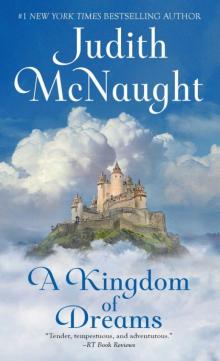 A Kingdom of Dreams
A Kingdom of Dreams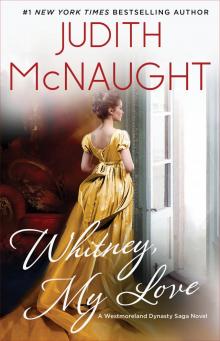 Whitney, My Love
Whitney, My Love Night Whispers
Night Whispers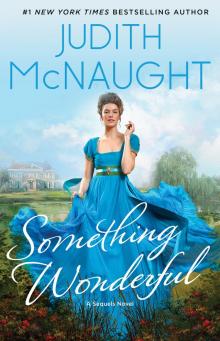 Something Wonderful
Something Wonderful Someone to Watch Over Me
Someone to Watch Over Me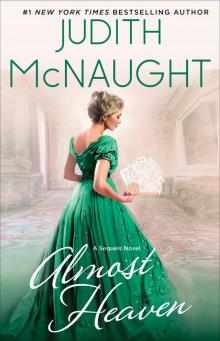 Almost Heaven
Almost Heaven Double Exposure: From a Gift of Love
Double Exposure: From a Gift of Love Tender Triumph
Tender Triumph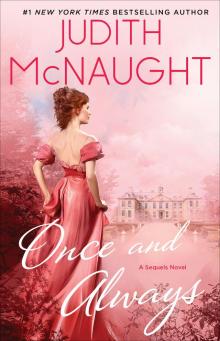 Once and Always
Once and Always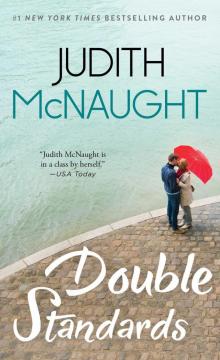 Double Standards
Double Standards